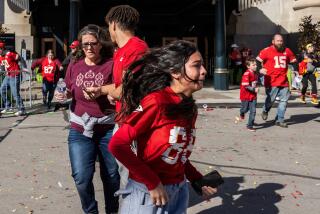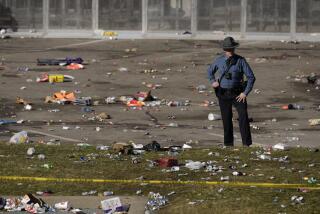After the Boston Marathon explosions, a daunting task for us all
The proliferation of cameras at the 117th annual Boston Marathon, one of the country’s most beloved and longstanding outdoor sporting events, ensured that whether or not we want to see what happened, we will be unable to avoid images of the two explosions and their aftermath.
Like an image burned onto a computer screen, those pictures will sear our retinas, then fade in time. But they will never completely go away.
And we will be forced to make sense of what has happened. Authorities believe the blast was deliberate. Boston police reported that after the two explosions that killed at least two people and injured more than 100 others, they found a device and detonated it.
All will be revealed in time as authorities piece together the evidence and witness accounts to come up with a narrative. Boston will repair itself physically, and the world will move on. The burden on those who were touched by the violence will never be fully lifted.
But the rest of us will also face a daunting task. Just as we were forced after 9/11 to figure out how to take an elevator to the top floors of an urban skyscraper without melting into puddles of fear, we will be forced to figure out how to stand on a crowded sidewalk again on a spring day -- for a race, a parade, a festival -- and maintain a sense of emotional equilibrium.
Do we silently calculate the odds of a bomb going off next to us? Do we scope out fast escape routes just in case? Or do we put the thought, and the images, out of our minds?
I listened to the president assure the country: “We will get to the bottom of this. And we will find out who did this; we’ll find out why they did this. Any responsible individuals, any responsible groups will feel the full weight of justice.”
He praised Boston as “a tough and resilient town. So are its people. I’m supremely confident that Bostonians will pull together, take care of each other, and move forward as one proud city. And as they do, the American people will be with them every single step of the way.”
His words were appropriate and on point, but I doubt anyone will remember them the next time they are in a crowded public square and have that thought, however fleeting, that something really horrible could happen.
So how should we think about our safety the next time we are in a crowd? I spent some time today reading about how to cope with random acts of violence. I was looking for a concise, if not magical, formula.
I’ve discovered there is none.
It’s easier to explain why these fears burrow so deeply into our psyches than it is to keep them out of our heads in the first place.
Random violence hits us hard because we can’t tell ourselves what we might have done to avoid it. “I would never live in that neighborhood” or “I would never walk there at night” don’t work as rationalizations when you are talking about something like a footrace in downtown Boston on a sunny day.
We have to make a leap of faith that what happened Monday in Boston will not happen to us. And then, because it probably, mostly, almost certainly is true, we have to make ourselves believe it.
ALSO:
LAPD chief says public plays an important role in security
Boston Marathon bombings: Torrance runner critically injured
Runners gather in Santa Monica to honor Boston Marathon victims
robin.abcarian@latimes.com | Twitter: @robinabcarian
More to Read
Start your day right
Sign up for Essential California for news, features and recommendations from the L.A. Times and beyond in your inbox six days a week.
You may occasionally receive promotional content from the Los Angeles Times.







